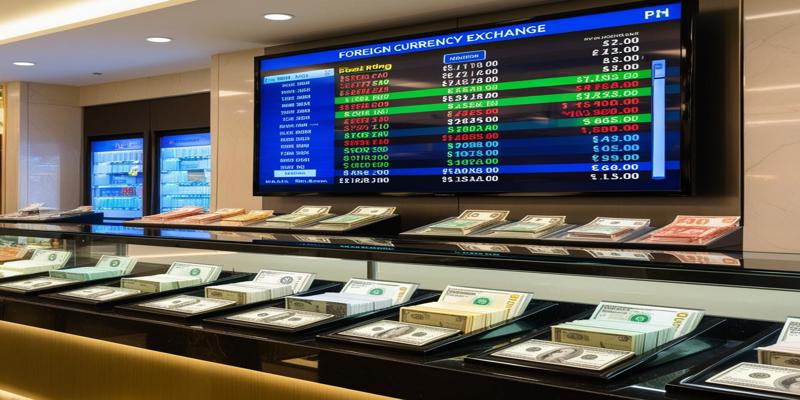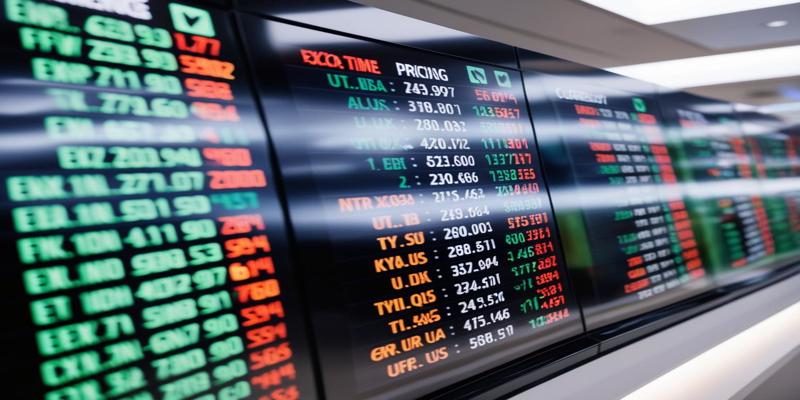Pricing for Foreign Exchange: What is the Interbank Rate?
Dec 11, 2024 By Elva Flynn
How do banks and financial institutions determine the exchange rates of foreign currencies? The interbank rate lies at the heart of that complex system- a benchmark that dictates how money is moved around in the form of currencies. In as much as you are one person or a company individual who engages in international trade or travel, the interbank rate can be beneficial in clearing up many cloudy waters surrounding foreign exchange.
What is the Interbank Exchange Rate?

An Interbank Exchange Rate, also known as the "wholesale" or "mid-market" rate, is the rate at which banks and other large financial institutions exchange currencies among themselves. This rate is the foundation for all foreign currency transactions and is the most appropriate and actual value display for a currency pair.
How It Works
Banks and other financial institutions constantly buy and sell large quantities of foreign currency. This makes for a liquid financial market in which foreign exchange rates change minutely based on the law of supply and demand. The interbank rate is the midpoint between the "bid," or buying price, and a currency pair's "ask," or selling price. Generally, it is only available in the largest-volume, bank-to-bank transactions and not directly to individual customers.
Significance for Consumers
While customers would need direct access to the interbank rate, knowing the rate is vital to any business or individual that needs to execute an international transaction. The interbank rate is a yardstick from which individuals and companies can get a very close idea of the reasonableness of the retail rates that these currency exchange services will provide. There is usually a markup over the interbank rate for retail exchange rates; the latter represents the margin for exchange services.
Factors Influencing Interbank Rates
Various influences can affect interbank exchange rates, such as:
- Economic indicators
- Political stability
- Interest rates
- Market speculation
How Interbank Rates Affect Retail Exchange Rates
The interbank rate forms the basis of retail exchange rates, which drive consumers' and businesses' prices when they need to exchange one currency for another. However, in practice, retail rates usually have a margin added on top of it, which is typically associated with production costs and profit concerns.
Markup and Spread
Financial institutions add a margin to the interbank rate, the difference between buying and selling prices. The spread is a way for banks, currency exchange providers, and other foreign exchange services to realize their profit in a foreign exchange transaction. This margin can take many different dimensions, including:
- Transaction volume
- Competition in the market
- The specific currency pair being exchanged
- The type of transaction (e.g., cash, electronic transfer, credit card)
Fluctuations and Timing
These interbank rates are always changing, sometimes dramatically, due to global economic events, political movements, and shifts in market sentiments. These fluctuations also affect retail exchange rates, but usually with a lag. Savvy consumers tend to monitor the interbank rate to get an idea of whether they are getting a fair deal on their currency exchange.
Impact on International Transactions
Understanding the relationship between interbank and retail rates is very important for a business involved in international trade or an individual who has to make cross-border payments. This will enhance financial planning and translate into colossal savings when dealing with large sums or numerous transactions.
How to Get the Best Exchange Rate as a Retail Customer

As a retail customer, the best exchange rate may significantly affect your finances when dealing with foreign currency. The following are a few ways to get favorable rates:
Compare Multiple Providers
Do not just accept the first exchange rate you find; instead, try shopping around. Compare rates among banks, online currency exchange websites, and local exchange bureaus. Online comparison tools to find the best rates quickly may also be helpful.
Time Your Transactions Wisely
Currency markets are ever-changing. Monitor exchange rate fluctuations and try to change money when the rates are favorable. Of course, no one can accurately predict how a market will behave at any moment, but knowing general economic news and events will help you make better decisions.
Avoid Airport and Hotel Exchanges
These places often have the worst rates. Be prepared and change some money before you go, or use host-country ATMs for a much better rate. Also, make sure to tell your bank you'll be traveling so that your cards don't get flagged overseas.
Frequently Asked Questions About Interbank Exchange Rates
What factors influence interbank rates?
Some influencing factors govern the interbank rates. Demand and supply are significant; when a currency is in strong demand, it appreciates and becomes stronger. Economic indicators like GDP growth, inflation, and employment figures directly affect the interbank rates. Geopolitical events and policies at the central bank level bring about significant fluctuations in these rates.
How often do interbank rates change?
Because the interbank rates are very dynamic, their quotations change every second of the trading day. This is due to changes in market conditions and events taking place all over the world. For most banks and other financial institutions, the quoted rates are revised much less frequently, usually once or a few times per day.
Can individuals access interbank rates?
The interbank rates are primarily utilized for bank transactions. As far as individual persons are concerned, access to interbank rates is indirect. A few online platforms quote exchange rates near interbank rates, and some fintech companies do the same. These rates have a slight markup since the companies must meet their operational and profit margins.
How do interbank rates differ from retail exchange rates?
Retail exchange rates are always unfavorably compared with the interbank rate, as consumers typically deal with. Banks and currency exchange services must add a markup onto the interbank rate to cover costs and realize their profit. This markup sometimes varies significantly between providers, so it is crucial to compare rates when exchanging currency.
Conclusion
The interbank rate is something an individual who deals with foreign currency exchange needs to understand. Remember that this wholesale rate serves as a yardstick upon which all other rates may base their premise as you dive deeper into the hustle and bustle of forex trading. You might not be able to access interbank rates directly; however, knowing how the interbank rates function empowers you to make informed decisions.








